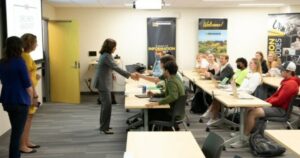For Javier Retana Jr., the chance to meet and talk to the vice president of the United States was an honor and a chance to represent the Latino community.
Retana, a UWM senior in civil engineering from Kenosha, is a first-generation university student. “My parents came here from small villages in Mexico, so they were excited that I had this opportunity.”
Retana was one of the participants in a roundtable on Hispanic community concerns who visited with Vice President Kamala Harris during her trip to the UWM campus Thursday, Sept. 22.
The students in Gina Vlach’s American Government class were somewhat surprised when the vice president stopped in to talk to them while on campus. However, having their class location moved, getting “wanded” before class and having two Secret Service agents sitting in had them asking questions about a potential distinguished visitor.
Vlach joked about it: “I told them, ‘Do you think I have that kind of pull?’” However, when a “wall of cameras” suddenly appeared at the back of the room, the secret was out.
Vlach is a graduate student in political science who leads the discussion session of the class taught by Kathleen Dolan, distinguished professor of political science. Vlach had been asked to keep the Harris visit secret until it actually happened.
In the roundtable with Hispanic community organizations, Harris discussed and listened to representatives who discussed issues of concern to the community.
Alberto Maldonado, director of UWM’s Roberto Hernández Center, was impressed with the vice president’s demeanor. “She was extremely responsive when I mentioned the work we are doing helping thousands of students from the community who aspire to excel and get ahead and are often the first ones in their family go to college.”
Feeling encouraged
In Vlach’s class, the vice president talked about the climate crisis and the need for the students – most of them freshmen – to lead on environmental causes. Protecting the planet should be a nonpartisan issue, she told them.
That was a message that resonated with Amber Myles, a first-year student in the American Government class who plans to become an environmental lawyer.
“She just solidified what I already knew, the climate crisis will be an even bigger issue for our generation than it is now,” Myles said. “And we must make the right decisions so that we can continue to live here.”
Myles said she was surprised by the class visitor and, though she didn’t have any questions for her, “I did tell her she was beautiful in person.”
She was also inspired by what the vice president represented.
“Meeting her was very important to me. I am the only black female in that class, so I felt encouraged to keep going along this path that I am on. Also being a retired naval veteran and being able to meet someone who is so important to our country right now was very big to me.”
There were cell phone photos aplenty in the brief classroom visit and student Averell Charlton Diesch got the vice president to sign a copy of the Constitution.
Stirring interest in government
Charlton Diesch is a junior transfer student from the University of Hong Kong, majoring in economics. He’s been considering a political science minor or maybe a second major because he’s interested in public administration.
“This (experience) will probably push me toward pursuing a second major,” he said. “I had her sign Article 1, Section 3, which she thought was a good choice given her actions as president of the Senate have been notable.” (That section of the Constitution refers to the composition and workings of the Senate.)
Like Myles, he appreciated Harris’ message about the environment.
“While the presenter was remarkable, the message itself wasn’t new, he said. “The environment is important and ultimately younger generations bear the responsibility to work to fix it because while we didn’t cause the problems, we have benefited from its exploitation and will have to pay the price if it isn’t done.”
This article has been edited for length. For a full version, visit the UWM Report website.
By Kathy Quirk, University Relations
